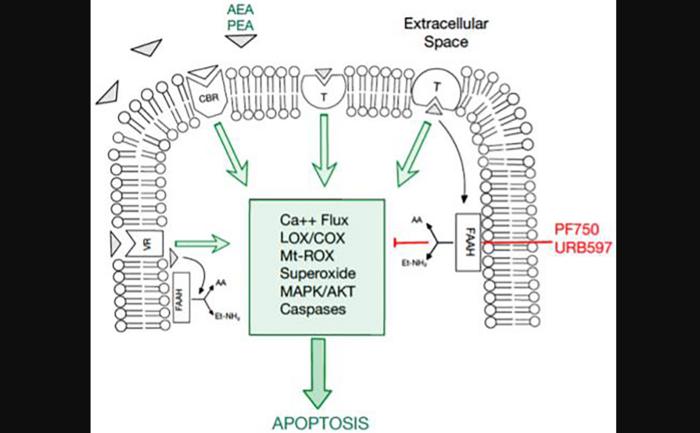“Besides being the most common, breast cancer is also a leading cause of cancer death in women worldwide.”

Credit: 2023 Tripathy et al.
“Besides being the most common, breast cancer is also a leading cause of cancer death in women worldwide.”
BUFFALO, NY- November 1, 2023 – A new research paper was published in Oncotarget’s Volume 14 on October 31, 2023, entitled, “FAAH inhibition ameliorates breast cancer in a murine model.”
Breast cancer is the leading cancer among females worldwide. Disease outcome depends on the hormonal status of the cancer and whether or not it is metastatic, but there is a need for more efficacious therapeutic strategies where first line treatment fails. In this new study, researchers Mallika Tripathy, Amy Bui, Jared Henderson, Jeffrey Sun, Christian Rutan Woods, Soumya Somani, Thao Doan, Anto Sam Crosslee Louis Sam Titus, and Chandra Mohan from the University of Houston’s Department Biomedical Engineering examined Fatty Acid Amide Hydrolase (FAAH) inhibition and endocannabinoids as therapeutic alternatives.
“This study explores the functional relevance and therapeutic potential of FAAH inhibition combined with the proapoptotic activity of exogenous endocannabinoids on breast cancer survival.”
FAAH is an integral membrane enzyme that hydrolyzes endocannabinoids, rendering them inactive, and FAAH inhibition is predicted to increase cancer cell death. To test this, breast cancer cells were probed for FAAH expression using Western blot analysis, treated with FAAH inhibitors, exogenous endocannabinoids, and combinations of the two treatments, and assessed for viability. High levels of FAAH were observed in different breast cancer cell lines.
FAAH inhibition was more effective than exogenous endocannabinoid treatment, and the combination of FAAH inhibitors and endocannabinoids was the most effective in inducing apoptosis of breast cancer cells in vitro. In addition, in vivo FAAH inhibition reduced breast cancer growth in immunodeficient mice. Further research exploring the therapeutic potential and impact of FAAH expression on cancer cells is warranted.
“FAAH inhibition is a promising approach, and tremendous progress has been made in the field to validate this mechanism as an alternative to chemotherapy.”
Read the full paper: DOI: https://doi.org/10.18632/oncotarget.28534
Correspondence to: Chandra Mohan
Email: [email protected]
Keywords: FAAH, breast cancer, cancer therapy, apoptosis
About Oncotarget: Oncotarget (a primarily oncology-focused, peer-reviewed, open access journal) aims to maximize research impact through insightful peer-review; eliminate borders between specialties by linking different fields of oncology, cancer research and biomedical sciences; and foster application of basic and clinical science.
To learn more about Oncotarget, visit Oncotarget.com and connect with us on social media:
- X, formerly known as Twitter
- YouTube
- LabTube
- Soundcloud
Sign up for free Altmetric alerts about this article: https://oncotarget.altmetric.com/details/email_updates?id=10.18632%2Foncotarget.28534
Click here to subscribe to Oncotarget publication updates.
For media inquiries, please contact: [email protected].
Oncotarget Journal Office
6666 East Quaker Str., Suite 1A
Orchard Park, NY 14127
Phone: 1-800-922-0957 (option 2)
###
Journal
Oncotarget
DOI
10.18632/oncotarget.28534
Method of Research
Experimental study
Subject of Research
Cells
Article Title
FAAH inhibition ameliorates breast cancer in a murine model
Article Publication Date
31-Oct-2023



